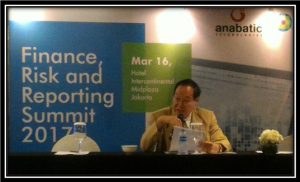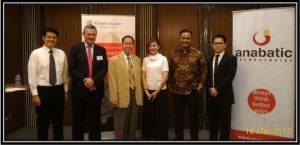IFRS 9 IMPLEMENTATION AGENDA
Dr Jan Hoesada, OJK Audit Board
.
IFRS Board consider that ECL that based on current credit condition plus estimated probable condition in the future will reflects fairvalue accounting in a more accurate manner, that probably will create higher volatility of loan loss provisioning, complicate financial planning and hit bank’s common equity tier 1.
We are now having around 500 days to be ready in implementing PSAK 71 Intrumen Keuangan, Indonesian version of IFRS 9, which will be effective on 1 Januari 2019. By December 2017, assisted by IAI and IAPI, all Indonesian accountants – ie. internal accountants, internal auditors and external auditors – should be ready in entering 2018 as the year of final trial and error in accounting process and auditing process of IFRS 9.
REGULATOR’S VIEW
The regulator’s view on how implementation progressing and potential solutions for Indonesia are as follows:
We encourage comparability and consistency in apllying IFRS 9, the use of competent economic information carefully, practicing GCG and sound management judgement in determining ECL. We encourage an extra disclosure of ECL assumption, macro data, business model, econometrics, and impact on financial strategy regarding IFRS 9.
Up to the end of December 2018, ideally, all Indonesian accountant should be able to
- Becoming an expert in impairment accounting for ECL. Recalculate impairment losses reserve based on new paradigm ie migration of obligors entering or nearing default. Mental switch from The Estimated Loss Model of Central Bank’s PPAP’s credit condition criteria (which is a backward looking accounting paradigm) and IFRS 39 / PSAK 55 to Expected Credit Loss – which is a forward looking accounting paradigm – especially
- Provision for 12 month ECL on relevant assets, according to IFRS 9
- Identify the increase of credit risk of a certain assets during the reporting date, according to IFRS 9
- Apply actual impairment of assets , in line with IFRS 39 and IFRS 9
- Becoming an expert in deciding the proper business model for IFRS 9
- Becoming an expert in ECL approach and modeling, ie. 12 months or life time ECL.
- To a certain extent becoming an expert using economic judgement base on a sound econometric calculation.
- Agreed upon supportive information for IFRS 9 ie.; competent source of information and information specification GDP Growth, inflation, unemployment, real estate industri condition, the Fed rate, SUN rate etc.
- Agreed upon the cyclicality of a certain macro risk
- Forward looking scenarios, examples or blue print
- Becoming an expert in the new era of hedge accounting, increase the capacity to judge on the circumstances where 80 % – 125 % treshold could not be applied, consider wisely the possibility of hedging mismatcch and macro hedging.
- Although a company applying amortized cost, fairvalue option ie FVTPL or FVOCI should always been analyzed properly.
- Applying the new era of banking earning management, in relation with the depletion of loan portfolio’s earning power dan capital ratio..
We encourage IAI and IAPI in assisting the accounting and auditing profession with
- Various seminar and professional training to address the above topics, a serial professional exams and certification on IFRS 9.
- Build a national consencus by the end of this summit meeting, for building a simple and uniform accounting guideline and/or a guided software in practicing IFRS 9, especially in
- Modeling, ie. (1) Business Model, (2) Stress Testing Model and (3) Econometric Modeling based on agreed upon a certain quality of general information, agreed upon competent source of public information and agreed upon sound judgement criteria, national wide.
- Changes in bank’s behaviour, changes in investor’s behaviour, the New Business Model and Risk Management in banking industry and New Database Management System based on IFRS 9.
- The new valuation system based on IFRS 9, combining past data with future probabilities which are not always ceteris paribus. The profession should, learning to regocnize, differentiate and categorize positif forward looking and negative forward looking, and its impact to expected credit losses.
- Corporate implementation plan and agenda for IFRS 9.
- Practical guidance for stress testing method , eg
- Definition and calibration, 5 years stress testing, up to 20 selected scenarios
- Weighting of scenarios, including stress lifetime probabilities of default, stressed behavioural assumption, weighted score on each scenario, and discounting policies
- Migration scenarios, from stage 1, to 2 and 3 in relation with business assumptions based on financial strategy, business strategy, portfolio movement policy, product mix, underwriting criteria, product life cycle, limit management, interest rate accross product mix and fee income estimate
- Well positioned IFRS 9 amongst other standards, and how to build a forward looking accounting policy.
We encourage the voluntary disclosure on IFRS 9 accounting process and assumption of the future, ie
- Build a symetry info climate in capital market industry
- Building public trust on your bank’s management competence in practicing IFRS 9 and overcoming various stress
- Voluntary Notes to FS; comparative evaluation of backward method of IFRS 39 / PSAK 55 and forward method of IFRS 9 / PSAK 71, including bad news or good news in relation with the changes in P/L, EPS, changes in capital, and tax
We are dealing with risk averse investor. A voluntary disclosure and a more frequent press release regarding any strategic condition might be favourable for any reporting entity. Lets build a symetry information landscape by disclosing ECL process in banking industry FS and capital market. In relation with IFRS 9, all FS prepares and FS Auditor should be aware of the possibility FV Accounting Fraud investigation by FSA or KPK.
Jakarta, March 16, condensed from key notes speech on Summit IFRS 9, March 16 Intercontinental Hotel


